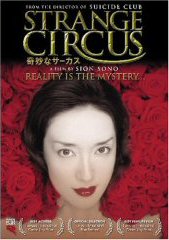
Once you break away from the excellent if repetitive ghost stories that have swarmed over the film market since the success of Ringu, Asian horror's other most marketable commodity has been the subversive film of violence and social chaos. These latter movies have thrilled audiences with their exotic world-view, subversive approach, and both the willingness and the ability to make the disturbing as beautiful as it mind provoking. Truly inspired subversive Asian horror uses archetypal images of weirdness and violence to dig past our cultural complacency into intimate areas of physical pain, fear of death, and emotional suspense, tapping into these with a fervour that home-grown filmmakers simply can't duplicate. One filmmaker particularly capable of merging the surreal with the violent, challenging both our moral views and dependence on perception, is Sion Sono, who confused the world with his 2002 debacle Suicide Club. Since his 1985 debut, Sono has been crafting hallucinatory poems to the senses, fusing esoteric ideas with physical carnage. A flawed mess of incoherent storylines more devoted to sensation than storytelling, Suicide Club itself was a narrative failure although it succeeded in terms of imagery. Strange Circus, his long awaited follow up, shows distinctive growth in his storytelling ability, retaining the strangeness of his askew world vision without sacrificing the internal logic that a truly successful narrative must display.
Perhaps one of the most scathing depictions of dysfunctional familial relationships ever recorded, this unsettling, perverse combination of incest and abuse is not fun 'popcorn' horror. In fact, Strange Circus dares you to embrace it. The plot is combative yet lyrical in its transgressions as we follow Mitsuko, a twelve year old girl whose perverse home life has aged her soul. Living in a well-to-do familial unit with her parents, Gozo and Sayuri, Mitsuko reluctantly becomes a pawn in the sick psychosexual fixation of her father. Gozo is the principle of a local school, far older than his wife, who nevertheless meets his own sexual energy with passionate duty. One day when Mitsuko checks out what all the fuss in the bedroom is about investigates, and gets recruited into the sex play. Repulsed yet? You will be. One fine day Gozo invites his daughter into his office while he watched porn, making sexual innuendos. Forcing her to watch him take her mother nightly within the confines of a cello case, Gozo proceeds from perversion to crime when he makes Mitsuko take the place of his wife! As Mitsuko tries to please her father's appetites, Sayuri is now made to watch, the roles of mother and daughter and wife having switched. Sayuri thrashes out at her daughter in jealousy, and one day, during a fight, is pushed down the stairs by Mitsuko. Soon, though, it becomes apparent that Sayuri's spirit lives on, infiltrating her daughter's body as the obsessed Gozo begins bringing home prostitutes. And then things get even weirder . . . In a moment of virtuoso post-modern fantasy, the movie distances itself from this sick drama (and to some extents the viewer) by questioning the reality of all that has come before. We meet reclusive Taeko Mitzusawa, a wheelchair-bound writer who deals almost exclusively with the Mitsuko character. As her new assistant begins to dig into her history, unearthing a secret room with a cello case, and wonders if his mistress is really crippled or just pretending, the mysteries intensify. Could Taeko be Mitsuko . . . ? Better yet, was Mitsuko even Mitsuko? The remainder of the film merges dream and waking, reality and fantasy with a stubborn refusal to confirm which is which. Frustrating, yes, but also fascinating.
If Suicide Club was a self-referential, incoherent attack against the senses that achieved cult status due to certain set-pieces rather than as a coherent whole, than Strange Circus is the best of both worlds, combining visual excess with narrative craftsmanship. It should appeal to fans of the director's past work as well as those who were estranged by his pervious lack of cohesion. Sono marries the surreal terror of the unknowable with elements that attempt to make sense on at least a metaphorical level. Meanwhile he retains that sense of awe that made his initial genre appearance such an event. Just as Suicide Club achieved its raw effect not by its story but by its rabidly individualistic existential worldview, so does this movie attack the self-satisfied status quo's fixation on logic. This is horror of both the visceral and intellectual kind, deep in blood and emotion. A drama at heart, the characters invite our empathy, making the tragedies more deeply felt. Pessimistic and nihilistic, the mean spirit of the drama is rooted in cosmic truths about our inhumane 'human condition' while mainstream entertainment peddles consumerism and banality. Strange Circus is challenging to watch, refusing to give up its secrets or logic easily, yet this is the point. Because nothing is tidily summed up or spooned to us, we must look for own definitions of what is occurring.
Review by William P. Simmons
| Released by TLA Releasing |
| Region 1 - NTSC |
| Not Rated |
| Extras : |
| see main review |